
How to Access Pornhub in the UK Without Age Verification 2026?
Since 25 July 2025, accessing porn sites like Pornhub in the UK won’t be as easy as it used to be. Under the new Online Safety Act, users will have to verify their age with an ID or even a face scan before they can view adult content.
However, the internet never stands still. Just hours after the law came into effect, tech-savvy users had already found several easy and free ways to get around these restrictions.
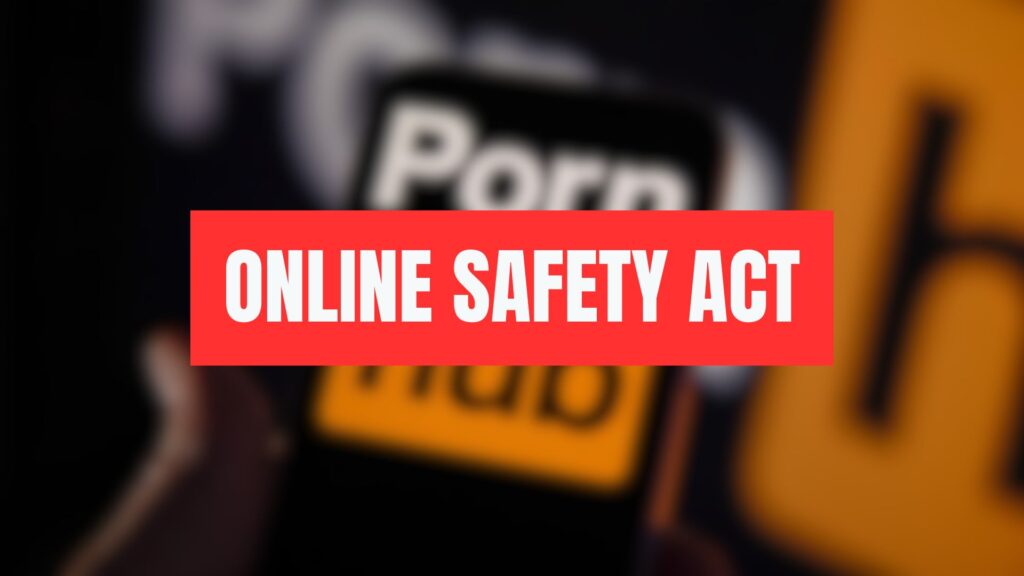
⚠️Disclaimer: SafePaper does not endorse any illegal activity. Please make sure to follow your local laws and privacy regulations.
Table of Contents
Why Can’t I Access Pornhub in the UK?
On 25 July 2025, the UK officially enforced the Online Safety Act. This law requires adult websites to implement “effective and secure” age verification measures to ensure that visitors are over 18 years old.
This means that in the UK, if you want to access sites like Pornhub, YouPorn, or certain adult communities on Reddit and Discord, you’ll first need to verify your age—using a face scan, ID check, or another approved method.
What Are the New UK Online Safety Rules?
This new rule is part of the Online Safety Act 2023, aimed at restricting children’s access to adult content and creating a safer online environment for them.
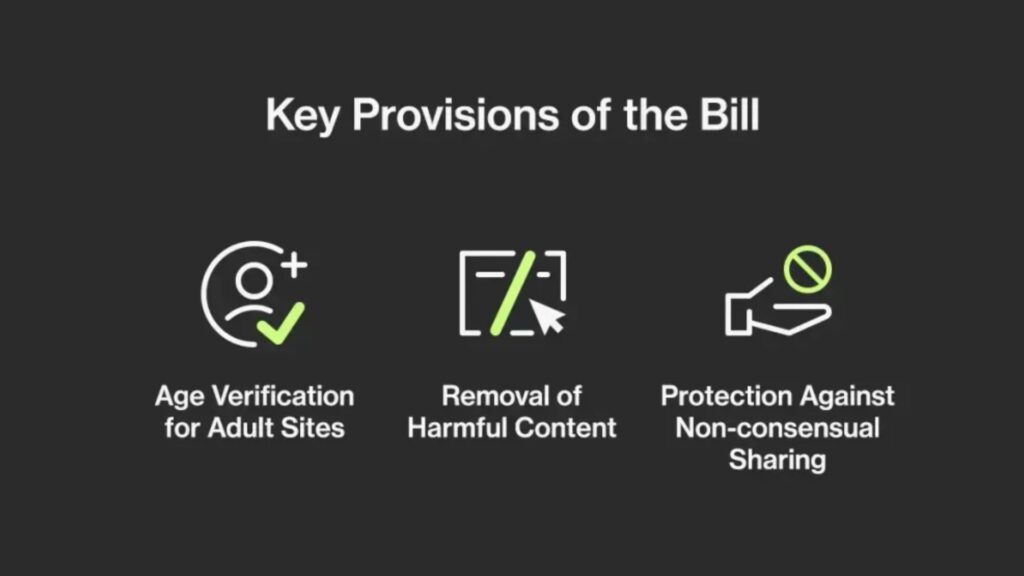
A concerning study previously showed that 59% of British teenagers aged 13 to 17 had encountered harmful online content, including pornography, self-harm, and extreme violence. The research also found, in many cases, that algorithms were accidentally pushing such content to even younger users.
The UK government says that the old pop-up, simply asking “Are you over 18?”, was too easy to get around and didn’t truly protect minors. This is why stricter legal measures are now necessary.
Which Sites and Apps Will Require Age Verification?
This law isn’t just for porn sites like Pornhub. It covers any platform in the UK with user-generated or professional adult content, especially if the site is publicly available:
- Adult websites: Pornhub, YouPorn, RedTube, xHamster, etc.
- Social media: Reddit (NSFW subreddits), X (formerly Twitter), Discord, Bluesky
- Dating apps: Tinder, Hinge, Grindr, etc.
The UK’s media regulator, Ofcom, is responsible for enforcement. Platforms that fail to comply can face fines of up to £18 million or 10% of their global revenue, whichever is higher. In the most severe cases, Ofcom can even apply for court orders to require internet service providers to block or restrict access to these sites.
How Does UK Age Verification Work?
Ofcom recommends 7 methods for age verification, and websites can combine multiple options for users to choose from:
- Facial Age Estimation: You upload a photo or video, and the system uses AI to analyse facial features to estimate age.
- ID and Selfie Check: Upload a photo of an ID showing your date of birth alongside a selfie. The system matches the two to verify identity.
- Open Banking Check: Authorise a bank to confirm you’re over 18. No account details are shared, just a yes or no.
- Digital ID Service: Use a digital ID wallet or app to securely confirm your age.
- Credit Card Verification: Submit your credit card info to verify that it belongs to someone over 18.
- Email Age Analysis: Some systems can estimate your age based on the services linked to your email address (e.g. banks or utilities).
- Mobile Phone Verification: The system checks with your ISP to see if your phone number belongs to an adult account holder.
Curious about how this works in practice? We accessed Pornhub using a UK IP.
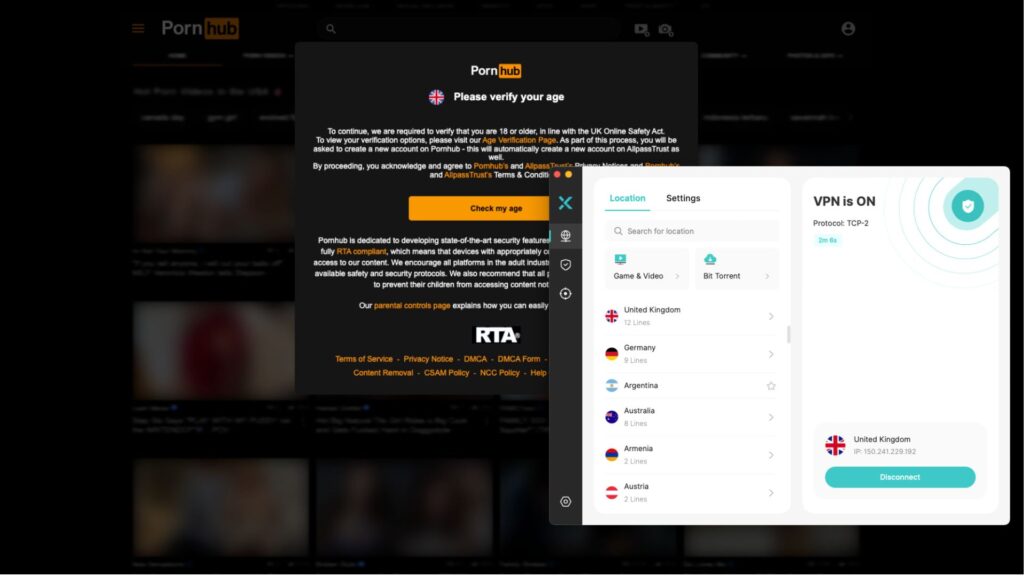
We were shown four verification options: Credit card, Email, Mobile phone, and Online banking.
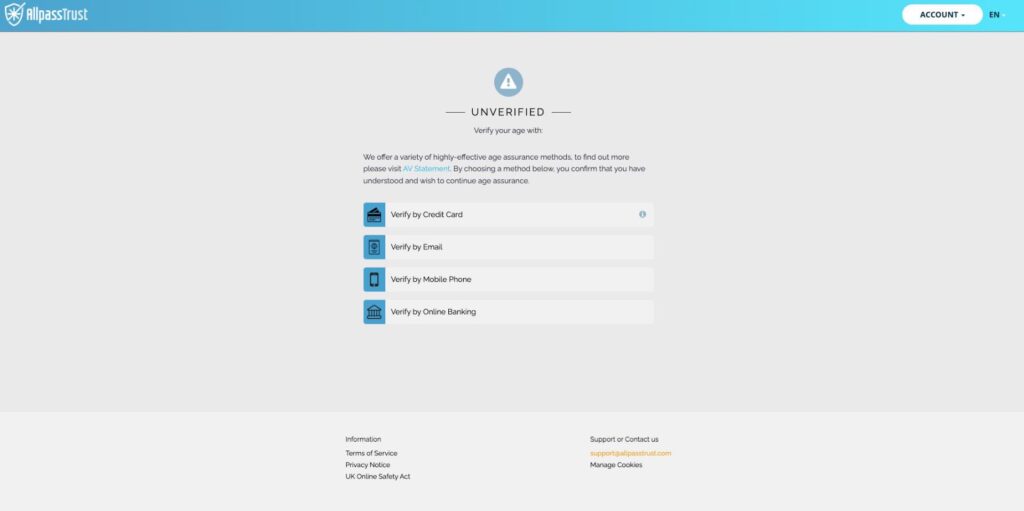
While the system is designed to balance safety and convenience, many people still feel uncomfortable. For lots of users, the bigger question now is: How can I access adult content without revealing my identity?
How People Are Bypassing Age Checks in the UK
Strict age verification rules in the UK have left visitors to adult sites with two choices: either upload their ID or find an alternative workaround.
In fact, just hours after the law began, people on Reddit and other forums were buzzing about how to regain access without official verification.
Most Popular Solution: VPN
For many tech-savvy users, bypassing age restrictions is as simple as using a VPN.
A VPN (Virtual Private Network) allows users to reroute their internet traffic through servers in other countries. As a result, many UK users are using free VPNs for PC to change their IP address to locations outside the UK, like Canada or Australia, to get around the age verification.
This method is clearly popular: on the day the law took effect, the demand for VPN searches in the UK surged by 500% to 1400%.
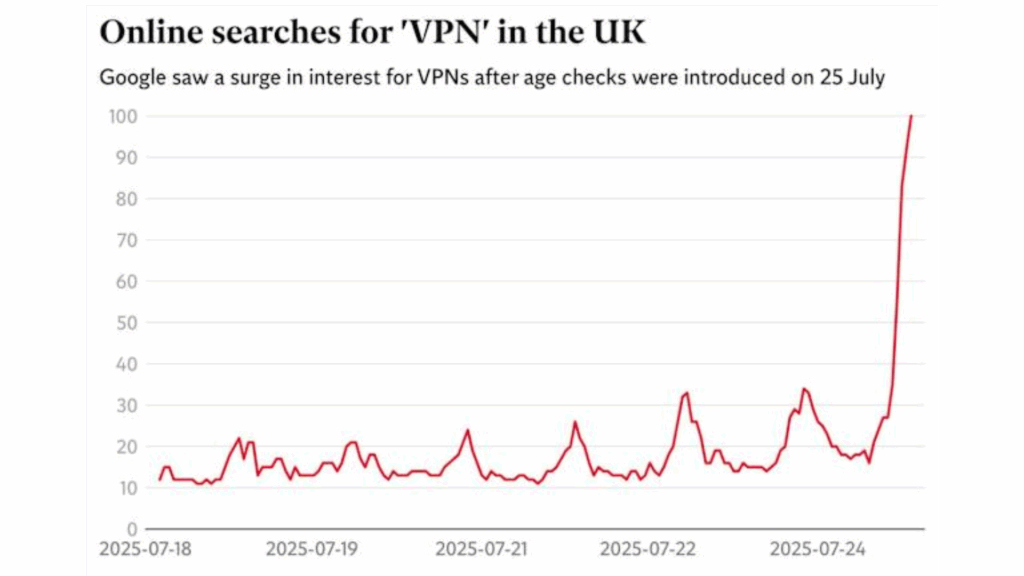
You can read How to change IP address to learn more about how VPNs and similar tools work.
Funniest Workaround: Death Stranding
On Reddit and Discord, users also discovered a humorous trick: using photo mode in the video game Death Stranding to generate realistic human faces that could fool AI-based age checks.

Even Hideo Kojima probably didn’t expect his game to be used this way.
Is It Legal to Use a VPN to Bypass Age Verification?
Currently, there’s no law in the UK that prohibits the use of VPNs, even if you’re using one to access restricted content. Here’s what you need to know:
The Law Doesn’t Ban VPN Use
The Online Safety Act regulates platforms, not individual users. Ofcom may fine adult websites or social platforms that fail to implement age checks, but UK users who access the web via a VPN won’t face legal penalties.
In fact, VPNs are widely used for everyday purposes, like protecting privacy, watching international Netflix, or staying safe on public Wi-Fi.
That said, while using a VPN to bypass age checks isn’t illegal, Ofcom discourages it, as it goes against the core aim of the law: to protect children online.
Using a VPN May Break Platform Rules
Legal use and platform policies aren’t the same thing. Some sites specifically forbid VPN use in their terms of service. If detected, they may restrict access or even suspend your account. But it’s a matter between you and the website, not a criminal case.
VPN Regulation May Get Tighter in the Future
If VPNs become a widely used workaround, the UK government may eventually follow countries like China or Iran in introducing tighter restrictions on VPN services. There’s no such plan at present, but in 2024, some MPs did propose fines for VPN providers that “enable underage access to adult content.”
In short, using a VPN to bypass age verification is a legal loophole for now, and individuals are unlikely to face prosecution. However, as regulations improve, this loophole might be gradually closed.
The Global Trend: Age Checks Are Going Worldwide
The UK isn’t the only country asking users to “prove they’re adults.” In recent years, child protection laws have started pushing the internet into an “age verification era.”
- United States: Pornhub and similar sites have already restricted access in at least 20 states to comply with local age verification laws.
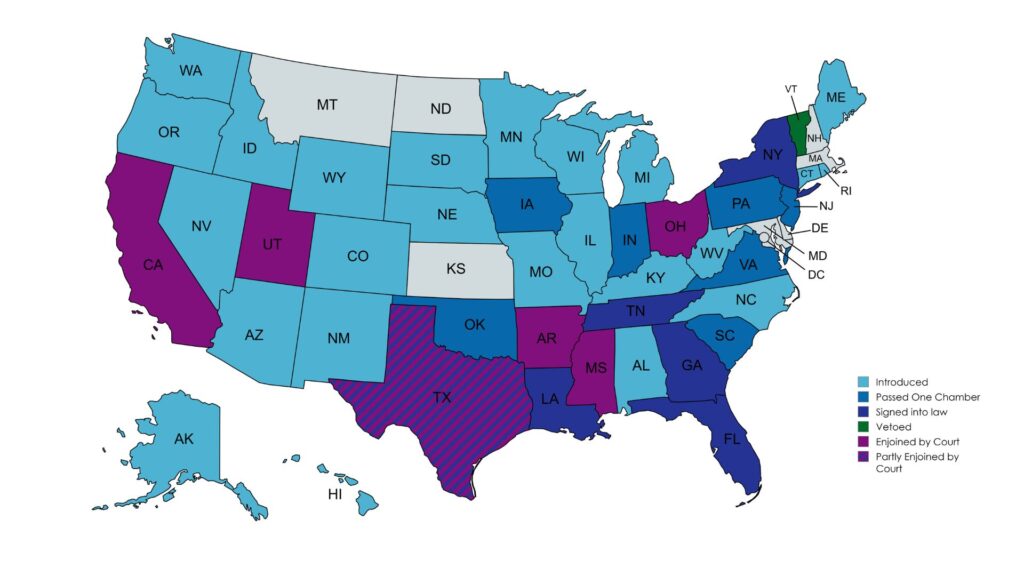
- France: A nationwide age-checking law came into force in early 2025, and Pornhub blocks access in France over Age Verification Law.
- Australia: A tough new social media law is set to take effect in December. It will require children under 16 to verify their age before using social platforms or search engines.
- Ireland: From mid-2025, video and social platforms will need to apply age checks for adult content, following new regulations passed by Ireland’s media watchdog in late 2024.
- European Union: While there’s no EU-wide age verification law yet, the proposed Digital Services Act (DSA) pushes for stronger protection of minors. Future updates may extend age checks to social media as well.
Are Age Verification Laws the Future of Online Safety?
The Online Safety Bill aims to protect minors from inappropriate content, which isn’t disputed. However, its implementation raises a key question: does it limit minors’ access to information while also exposing them to digital security risks?
Here are some of the major concerns:
1. Data leaks and identity theft
Providing ID documents or sensitive details means this data must be temporarily processed or even stored. If a platform is hacked or mishandles the information, user data could be exposed or end up for sale on the dark web.
2. Potential mass surveillance
Although Ofcom has called for “minimal data collection” and “no long-term storage,” there’s still uncertainty around how this will be enforced and who’s actually checking.
3. Trust issues with third-party verifiers
Third-party companies like Yoti and AgeID handle sensitive data, forcing users to trust these “middlemen” not to leak or misuse information. However, there is a lack of effective regulation.
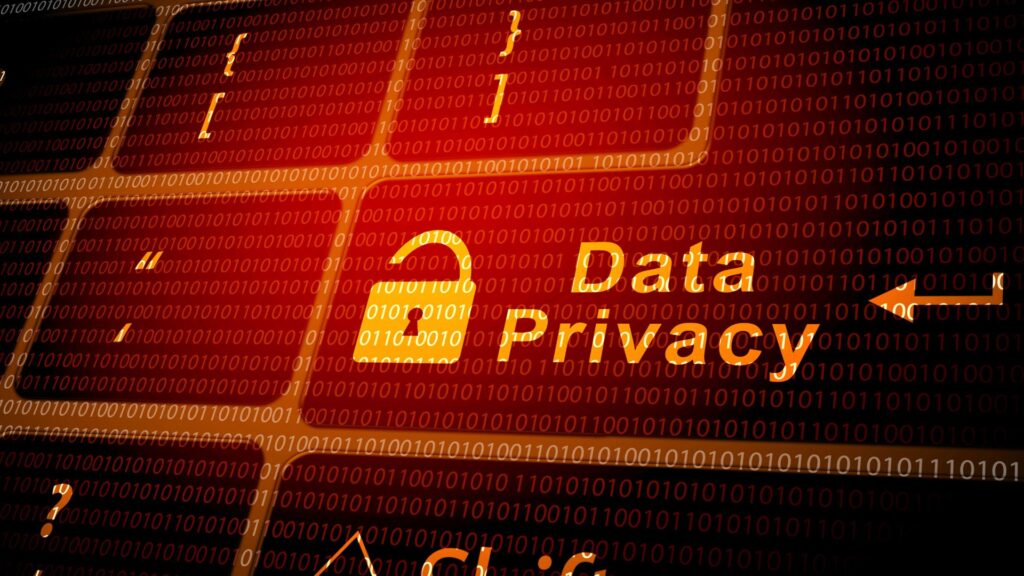
4. Lack of transparency
Most platforms don’t clearly explain how long your data will be kept, whether it’s shared elsewhere, or how to delete it. This leaves users unsure if a “one-time check” could turn into long-term tracking.
5. The slow death of anonymity
Many privacy advocates argue that the law focuses too much on the outcome (blocking underage users) and not enough on the cost, sacrificing the rights of adults to browse anonymously and control their data.
Privacy anxiety is leading to “adversarial behaviour.” When users don’t trust platforms or verification systems, they naturally look for ways to bypass them.
- VPNs are booming: Many are now turning to VPNs to avoid giving out their personal info. One UK user joked on Reddit, “They want to stop kids from watching porn—what they’ve done is teach a whole generation to use VPNs.”
- Moving to riskier platforms: Some users are turning to more hidden or unregulated sites, which could actually be more dangerous for young people.
The debate around privacy and safety is heating up—and it’s far from over. As more countries consider following the UK’s lead, people are left wondering: Are we creating a future where access to the internet always comes at the cost of our privacy?
The answer could shape the future of digital freedom for the next generation.
Final Words
With the UK’s Online Safety Act now in effect, the way British people access adult content is going through a major shift. Some choose to follow the new rules, while others look for legal workarounds. Actually, this isn’t simply a choice between protecting children and protecting privacy — it’s about asking whether we can have both.
As more countries consider similar laws, each of us will need to find our own balance between staying safe and staying private online.




